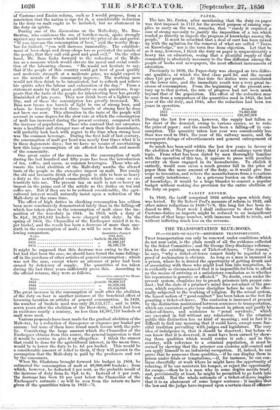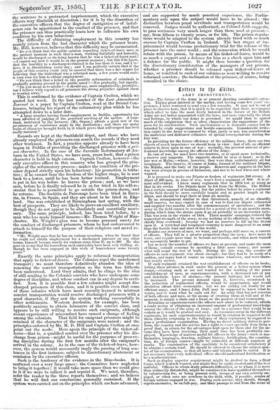THE TRANSPORTATION BLUE-BOOMS.
IY.—TICRET-OF-T.FAYE—REFORMZED •TRA .NSPORTATION.
THAT transportation can only be renewed under conditions which do not now exist, is the plain result of all the evidence- collected by the Select Committee; and Sir George Grey disclaims reforma- tion for the existing system of Ticket-of-leave. " The reason," he says, "why a ticket-of-leave cannot fairly be regarded as a proof of reclamation is obvious. As long as a man is immured in a prison, where he is denied the opportunity of getting drunk and of associating with those who might lead him into temptation, he is evidently so circumstanced that it is impossible for him to afford us the means of arriving at a satisfactory conclusion as to whether his repentance is genuine or affected." No doubt, even under the present system, chaplains try to preach prisoners into proper con- duct ; but the state of a prisoner's mind does not admit of the pro- cess which requires a previous discipline before he can be effec- tually subjected to the working of religion. By the actual system, the laxest notion of "good conduct" 'has 'been taken as the test for granting a ticket-of-leave. The confusion is increased at presenit by the distinction maintained between sentences to transportation, which are executed, partly by confinement in prison and partly by ticket-of-leave, and sentences to " penal servitude," which are executed in full without any relaxation. To the criminal public this distinction has no kind of meaning; •and in fact it is difficult to find any meaning that it could have, except some fan- ciful tradition prevailing 'with judges and legislators. The very idea of indulgence is that it should be deserved; but before we can know that it is deserved, it must have been earned by show- ing those qualities which would render it safe ; and •in this country, with reference to a criminal population, it must be earned by showing that the prisoner can exercise self-control and can apply himself to an industrial occupation. If, indeed, he can prove that he possesses those qualities,—if he can display them in prison under trials or temptations,—if, for instance, he can con- tinue cheerfully at work where he might have the opportunity of relaxing, if he can maintain his temper, or reject the opportunity for escape,-then he is a man who in some degree merits trust; and, provisionally at least, he might be permitted to go forth into the world. But the whole rationale of a ticket-of-leave implies that it is an abatement of some larger sentence : it implies that the law and the judge have imposed upon a certain class of offences
the sentence to a protracted imprisonment, which the executive officers may diminish at discretion ; for it is by the discretion of the executive officers that the degree of castigation or of indul- gence can be apportioned to the conduct of the prisoner, and that the prisoner can thus practically learn how to influence his own condition by his own behaviour.
The difficulty of obtaining employment in this country has mainly arisen from the bad character which the prisoner bears. Mr. Hill, however, believes that this difficulty may be surmounted. "Do you think that the public opinion regarding ticket-of-leave men at the present moment is such that a man, working faithfully and honestly, would be discharged on its being known that he was a ticket-of-leave man? —I cannot say how it would be at the present moment ; but this I do know, that the hostility to a discharged criminal is far less than it was, and I be- lieve it is diminishing every day.; and I am perfectly certain that if the people of this country could only be assured that there was a fair reason for believing that the individual was a reformed man, a few years would make it very easy for him to obtain employment.
"Do you think that a belief in the possible reformation of criminals is gradually gaining ground in the public mind ?—Not gradually, but rapidly.
"Do you mean as to adults ?—I should say, more emphatically, juveniles.; but I believe with regard to all prisoners the strong prejudice against them is wearing away." This is eonthmed by the evidence of Captain Crofton, whiCh we quoted last week. In the last number of the Law Amendment Journal is a paper by Captain Crofton, read at the Bristol Con- ference, bringing his report of the reformatory- plan which he has attempted down to a later date. " A large number having found employment in Dublin, opportunity has been afforded of judging of the practical working of the system. A loan- fund, instituted by the lecturer, (Mr. Organ,) affords a good test of the permanency of resolutions made in the institution ; and there are many traits of character brought forth by it which prove that self-respect has been really restored." Records are kept at the Smithfield depot, and those who have already employed the prisoners can search the records if they need other workmen. In fact, a practice appears already to have been begun in Dublin of providing the discharged prisoner with a pri- son character. In the case of the Juvenile Reformatory at Au- burn in the United States, we have seen, years back, that a prison character is held in high esteem. Captain Crofton, however—the only executive officer in this country who has grasped the prin- ciples of the reformatory process—makes the condition of the pri- soner depend strictly upon his behaviour : his promotion is tenta- tive; he cannot bear the freedom of the higher stage, he is sent ba:d to a lower, until he has been better trained. Employment is put in his way before he leaves the prison ; and, as we have seen, before he is finally released he is so far tried in his self-re- straint that he is permitted to go outside the prison-doors, 'and lie returns. The Societe's do Patronage have been tried in Baya- ria, in France, in Spain, and they are about to be tried in Eng- land. One was established at Birmingham last spring, with the best of prospects. They are likely, to prove an excellent auxiliary, though they do not appear to be absolutely and essentially neoes- Buy. The same principle, indeed, has been tried before, by a man who has made himself famous—Mr. Thomas Wright of Man- chester. Mr. Wright's plan was to become personal surety for the conduct of discharged prisoners, whom he had endeavoured to attach to himself for the purpose of their religious and moral re- formation.
"Mr. Wright says that be has on various occasions, when he found that he could not obtain employment for a discharged prisoner on any other terms, himself become surety for various sums from W. up to 201. He also goes on to say that his losses from such suretyship have been very trifling, al- though he has been engaged in this work of benevolence some twenty years."
'Exactly the same principles apply to reformed transportation that apply to ticket-of-leave. The Colonies repel the unreformed transport ; we must therefore definitively abandon the idea of renewing the convict transportation as the term has hitherto been -understood. Lord Grey admits, that he clings to the idea of still sending to the Colonies convicts who have undergone some degree of discipline, and whose conduct can in any degree be certi- fied. Now, it is possible that a few colonies might accept dis- charged prisoners of this class, and it is possible even that some of those colonies which have most recently learned to mistrust convict transportation would receive discharged prisoners with a good character, if they saw the system working successfully in other settlements. Western Australia, for example, has been positively anxious to obtain labourers of the convict class, and appears to be still willing to receive such emigrants, although recent experiences of misconduct have caused a change of feeling among the colonists. That field for emigrant prisoners might be retained if the character of the emigrants were raised; and the principles enforced by Mr. M. D. Hill and Captain Crofton at once point out the mode. Here again the principle of the ticket-of- leave—that is, a qualified control over the prisoner after his dis- c e from prison—might be useful for the purposes of preserv- ing "scipline during the first few months after the emigrant's arrival in the colony. As in the case of the ticket-of-leave, how- ever, the system would necessarily imply the passing of long sen- tences in the first instance, subject to discretionary abatement or remission by the executive officers.
Such is the tendency of the evidence in the Blue-books. It is
'scattered over a very large space ; the Committee have neglected -to bring it together; it would take more space than we could give to it if we were to collect it and reprint it. We must, therefore, refer the reader to the three reports themselves ; and we believe
that he will find our conclusions generally sustained. If the system were carried out on the principles which are here advanced,
and are supported by much practical experience, the Parlia- mentary acts upon the subject would have to be altered : -the distinction between penal servitude and transportation would be removed. Judges would be authorized, as Colonel Jebb suggests, to pass sentences very much longer than those used at present— say, from fifteen to twenty years, or for life. The prison-regula- tions would be adapted to the system already tried with so much success by -Captain Crofton in Ireland. The last stages of im- prisonment would become probationary trial for the release of the prisoner into the outer world ; and the connexion which he would retain with the prison, by means of his ticket-of-leave, would be as much a support and a defence for him as a check upon him and a defence for the public. It might then become a question for the discretionary consideration of the managers of our prisons, whether a prisoner should be released upon ticket-of-leave at home, or remitted to such of our colonies as were willing to receive reformed convicts ; the inclination of the prisoner, of course, being consulted in the choice.



























 Previous page
Previous page